FUN WITH SLAVERY
A couple of questionable dramatic decisions aside, Django Unchained is a very entertaining film, boasting some outstanding performances, limber and witty direction, and a dynamic (and now Oscar-winning) script with an abundance of sharp dialogue. Quentin Tarantino’s latest invention is a wish-fulfillment fantasy – an American hero movie – a western modeled on westerns that were modeled on westerns; there is no attempt at “realism.” And it works very well. Same is true for the characters. They are archetypes reinvented yet delightful. On the one hand that’s pretty much all that needs to be said. Tarantino wasn’t trying to create a truthful work of art, he was trying to make entertainment, and he succeeded; Django Unchained is a fun, clever ride.
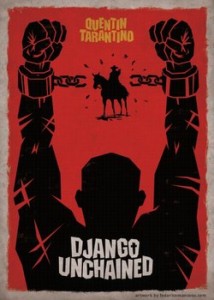 On the other hand I do have a few questions: Why can’t the character of Django be a genuine former field slave with the bad habits, nastiness and brutality associated with that condition? We get symbolic, Hollywood versions of these qualities, but why are they not depicted with authenticity? I refer not to realism, as that would disgust and offend a modern audience beyond dramatic necessity, but isn’t there perhaps a middle ground – a sense of human veracity but without a vividness that would make his character unrelatable to modern sensibilities? Couldn’t he be in love with his wife and have sex with a whore, for example? Or be gentle at times and at times a brute without reservations? Couldn’t he be constructed as a human instead of making him out of titanium? Perhaps the studios believe that the general viewing public is too stupid and squeamish to accept a hero with real flaws and the real characteristics of a former “field nigger.” And for the most part they’re right. But couldn’t someone like Tarantino, who has both the popular and the artsy crowd following him, do something like that? I was hoping he would have.
On the other hand I do have a few questions: Why can’t the character of Django be a genuine former field slave with the bad habits, nastiness and brutality associated with that condition? We get symbolic, Hollywood versions of these qualities, but why are they not depicted with authenticity? I refer not to realism, as that would disgust and offend a modern audience beyond dramatic necessity, but isn’t there perhaps a middle ground – a sense of human veracity but without a vividness that would make his character unrelatable to modern sensibilities? Couldn’t he be in love with his wife and have sex with a whore, for example? Or be gentle at times and at times a brute without reservations? Couldn’t he be constructed as a human instead of making him out of titanium? Perhaps the studios believe that the general viewing public is too stupid and squeamish to accept a hero with real flaws and the real characteristics of a former “field nigger.” And for the most part they’re right. But couldn’t someone like Tarantino, who has both the popular and the artsy crowd following him, do something like that? I was hoping he would have.
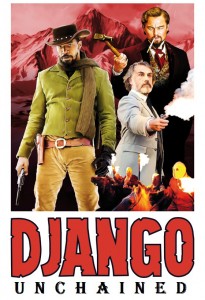 Also, typical of Tarantino, the movie is sexless. With Reservoir Dogs, Pulp Fiction and Jackie Brown, this wasn’t an issue, but with a movie about slavery and cowboys it seems sex would be an essential element. And if you’re really making a Blaxploitation film you should probably throw at least one scene of rape or lust in there, as an homage if nothing else.
Also, typical of Tarantino, the movie is sexless. With Reservoir Dogs, Pulp Fiction and Jackie Brown, this wasn’t an issue, but with a movie about slavery and cowboys it seems sex would be an essential element. And if you’re really making a Blaxploitation film you should probably throw at least one scene of rape or lust in there, as an homage if nothing else.
But the biggest question seems to me this: Is American slavery morally appropriate fodder for light entertainment? The tempting answer is: “Stop nitpicking and don’t be so uptight!” We know going in more or less what this movie will be like. By agreeing to watch it we enter into an unspoken contract of sorts, which states that we will suspend not only our temporal but also our moral and spiritual disbelief and accept the world on the screen and its laws in order that we may be entertained.
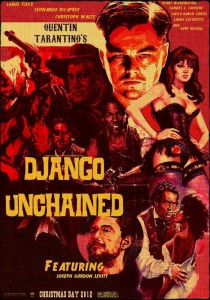 Still, I wonder if I would have liked this movie as much if, say, Django was a Jew who escaped a Nazi concentration camp and was now, with his superhuman gunplay, singlehandedly defeating if not the Reich then, let’s say, all the German soldiers stationed at Auschwitz? Having this Jewish Django destroy the Nazis all by himself would rob of their dignity not only the victims of concentration camps, many of whom were strong, brave and capable individuals, but all the people who fought, sacrificed, suffered and died fighting the Germans in WWII. Tarantino already made a movie that was something like this, Inglourious Bastards, which, dramatic flaws aside, I found morally reprehensible. In that movie, a few American Special Forces troops, with the help of a (spoiler) beautiful blond Jewess theater owner, blow up Hitler and his minions. I suspect Tarantino thought a Jew watching such a thing would enjoy it, this fantasy of Hitler being blown up, as well as of Germans being scalped and beaten to death with baseball bats. But I’m not certain he was correct. For instance, there was a real-life concentration camp girl who had to keep shitting out and swallowing the diamond earrings her mother gave her before her mother was stripped and gassed along with millions of others; I wonder if she would find much satisfaction in Tarantino’s ridiculous fantasy. Nor am I convinced that any WWII soldiers who participated on the side of the Allies would find very amusing the idea that all that was needed to kill Hitler and defeat the Nazis was a handful of well-trained soldiers and a good plan.
Still, I wonder if I would have liked this movie as much if, say, Django was a Jew who escaped a Nazi concentration camp and was now, with his superhuman gunplay, singlehandedly defeating if not the Reich then, let’s say, all the German soldiers stationed at Auschwitz? Having this Jewish Django destroy the Nazis all by himself would rob of their dignity not only the victims of concentration camps, many of whom were strong, brave and capable individuals, but all the people who fought, sacrificed, suffered and died fighting the Germans in WWII. Tarantino already made a movie that was something like this, Inglourious Bastards, which, dramatic flaws aside, I found morally reprehensible. In that movie, a few American Special Forces troops, with the help of a (spoiler) beautiful blond Jewess theater owner, blow up Hitler and his minions. I suspect Tarantino thought a Jew watching such a thing would enjoy it, this fantasy of Hitler being blown up, as well as of Germans being scalped and beaten to death with baseball bats. But I’m not certain he was correct. For instance, there was a real-life concentration camp girl who had to keep shitting out and swallowing the diamond earrings her mother gave her before her mother was stripped and gassed along with millions of others; I wonder if she would find much satisfaction in Tarantino’s ridiculous fantasy. Nor am I convinced that any WWII soldiers who participated on the side of the Allies would find very amusing the idea that all that was needed to kill Hitler and defeat the Nazis was a handful of well-trained soldiers and a good plan.
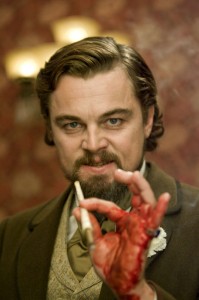 And so it is with Django. Making him a successful superhero trivializes the realities of slavery. It trivializes the suffering of enslaved human beings, the tragedy of the strong and proud who were broken, the helplessness of blacks in the south and the hopelessness of their situation, the insurmountable obstacles between them and anything resembling freedom. It also trivializes whatever sacrifices or acts of bravery individual slaves might have committed. Watching this film I couldn’t help but try and imagine the reality of a black man, strong of body and spirit, intelligent, brave, who is a slave on a Mississippi plantation. What is he supposed to do? If he runs he’ll get caught. If he fights, he’ll get tortured or killed. What can he do when all the public and private forces of that state and of all the states surrounding it are against him? Just the question of “Why doesn’t he do something?” presupposes that slavery is some sort of choice.
And so it is with Django. Making him a successful superhero trivializes the realities of slavery. It trivializes the suffering of enslaved human beings, the tragedy of the strong and proud who were broken, the helplessness of blacks in the south and the hopelessness of their situation, the insurmountable obstacles between them and anything resembling freedom. It also trivializes whatever sacrifices or acts of bravery individual slaves might have committed. Watching this film I couldn’t help but try and imagine the reality of a black man, strong of body and spirit, intelligent, brave, who is a slave on a Mississippi plantation. What is he supposed to do? If he runs he’ll get caught. If he fights, he’ll get tortured or killed. What can he do when all the public and private forces of that state and of all the states surrounding it are against him? Just the question of “Why doesn’t he do something?” presupposes that slavery is some sort of choice.
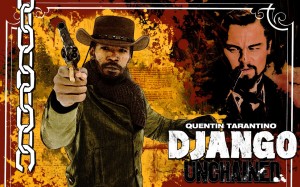 Some may posit that being born a slave and raised as a slave surrounded by slaves one can somehow, with a little guidance, transcend that mentality and emerge unscathed. This is similar to saying that one can come through torture undamaged, which this movie does say by the way, and which is equally flippant. True, Tarantino goes out of his way to put in verbal explanations for why we should believe what we are seeing, trying to convince us through bits of dialogue here and there why certain incredible things about Django and the world of the film are in fact dramatically sound. But the spectacle we are watching is undeniable and all the little speeches feel like expedient excuses made so that we keep suspending our disbelief.”
Some may posit that being born a slave and raised as a slave surrounded by slaves one can somehow, with a little guidance, transcend that mentality and emerge unscathed. This is similar to saying that one can come through torture undamaged, which this movie does say by the way, and which is equally flippant. True, Tarantino goes out of his way to put in verbal explanations for why we should believe what we are seeing, trying to convince us through bits of dialogue here and there why certain incredible things about Django and the world of the film are in fact dramatically sound. But the spectacle we are watching is undeniable and all the little speeches feel like expedient excuses made so that we keep suspending our disbelief.”
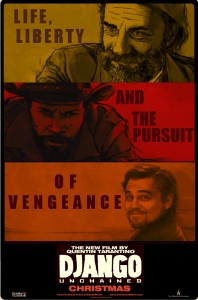 So where do we draw the line as to what is or is not appropriate to fictionalize? Is it a question of how much time has passed since the events at issue? Will there ever be a time when it is no longer laughably stupid and disgusting to portray Lincoln as a vampire hunter? Kathryn Bigelow evidently thinks there’s nothing wrong with telling us that torture was instrumental in extracting information that led to Bin Laden, even though it’s pretty much an established fact that it was not. Spielberg makes a movie prostituting the Holocaust, in which the tragedy of the event is obscured by style, sentimentality, and clever but superficial direction. To me it seems the question is for the filmmaker’s conscience to answer. I see nothing wrong with reinventing history – nobody knows what really happened anyway – as long as your creation is truthful (or at least if your intention is to create something truthful). And I’m not talking about getting some facts right or having accurate costumes or being faithful to the book you’re adapting. I’m talking about artistic truth. Are you creating something more profound than the historical facts around which you are weaving your creation? (This is why it’s almost impossible to make a good fictional movie about the Holocaust – there’s very little one can say artistically that will carry more weight than the subject matter.) The question is this: Is the raw material, whether it be historical or another piece of fiction, essential for you to express some vital and deeply personal truth?
So where do we draw the line as to what is or is not appropriate to fictionalize? Is it a question of how much time has passed since the events at issue? Will there ever be a time when it is no longer laughably stupid and disgusting to portray Lincoln as a vampire hunter? Kathryn Bigelow evidently thinks there’s nothing wrong with telling us that torture was instrumental in extracting information that led to Bin Laden, even though it’s pretty much an established fact that it was not. Spielberg makes a movie prostituting the Holocaust, in which the tragedy of the event is obscured by style, sentimentality, and clever but superficial direction. To me it seems the question is for the filmmaker’s conscience to answer. I see nothing wrong with reinventing history – nobody knows what really happened anyway – as long as your creation is truthful (or at least if your intention is to create something truthful). And I’m not talking about getting some facts right or having accurate costumes or being faithful to the book you’re adapting. I’m talking about artistic truth. Are you creating something more profound than the historical facts around which you are weaving your creation? (This is why it’s almost impossible to make a good fictional movie about the Holocaust – there’s very little one can say artistically that will carry more weight than the subject matter.) The question is this: Is the raw material, whether it be historical or another piece of fiction, essential for you to express some vital and deeply personal truth?
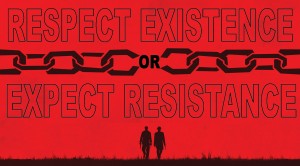 With Django the answer is no. However, whereas Zero Dark Thirty and Schindler’s List are entertainments disguised as serious films, Django does not pretend. It comes out and says: This is Blaxploitation reinvented, enjoy! But then what is a socially and artistically responsible individual supposed to do? Even though its artistic and moral shortcomings do bother me on an intellectual level, I was not turned off by the film. And I will probably watch it again. But it would be nice if not so many filmmakers were so completely invested in making such frivolous films.
With Django the answer is no. However, whereas Zero Dark Thirty and Schindler’s List are entertainments disguised as serious films, Django does not pretend. It comes out and says: This is Blaxploitation reinvented, enjoy! But then what is a socially and artistically responsible individual supposed to do? Even though its artistic and moral shortcomings do bother me on an intellectual level, I was not turned off by the film. And I will probably watch it again. But it would be nice if not so many filmmakers were so completely invested in making such frivolous films.
posters/still courtesy of The Weinstein Co.
Django Unchained
The Weinstein Co.
U.S.A. / rated R / 2 hr. 46 min.
in wide release
available on DVD April 15, 2013
for more info, visit http://unchainedmovie.com/
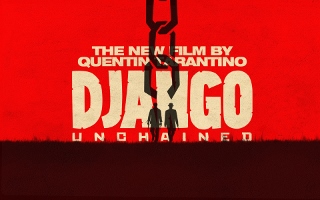

{ 3 comments… read them below or add one }
Nobody does style like Tarantino, and his zany slavery Western is nothing if not unabashed style and that was perfect with me. Good commentary Mr. Zvonkov.
Thank you.
Critics as teachers: Those who can, do; those who can’t, criticize.
Apologies to great teachers.
All directors are knocked around between this pillar: Gotta make it entertaining … box office gross is GOD; and this post: Provide a moral … the liberal mindset of many, maybe most, viewers of cinema likes to feel good so that those w/that faux social conscience can sit back and … do nothing.
Seeing movies ought to be, in an impossibly perfect world, motivation-stimulus, not motivation-anesthetic.
“Django” was the 1st movie I’d seen since “The Hobbit” which was the 1st I’d seen in at least a year. My younger son took me to see the latter because the Trilogy was our last joint cinematic experience before he was old enough to drive himself and dispense w/dad. It was motivation-stim for him to renew the closer relationship, though, technically, the particular movie didn’t provide the stim, but the pleasant memories associated with Tolkien/Jackson.
My older son, on the occasion of another and recent important renewal, played the “Django” DVD for all of us gathered together. Tarantino films, that son’s fave, had never been attractive personally; all at the pillar, no post. Sitting down to watch “Django” w/the verylow expectation of being un-treated to “The Wild Bunch” redux, there was, un-expectedly motivation stim.
There being no Tarantino comment (as far as I know) on the script itself, but, also, understanding that, when the messages start to pile very high, the stim is intended, not some accident of fortuitous writing.
The foremost moral (for me): Envision all those slaves as modern white Americans, especially Samuel L., and get the awful condition of our society rammed down your consciousness w/manymany bullets. DiCaprio renders, for me, an excellent send-up performance of the King of Pimps, David Rockefeller. And, Christof Waltz, as appropriately, a non-American character, underscores the enormous gulf between the obscenely bigoted culture in white-male-dominated, Red-State Murrica and most other national cultures embarrassingly more enlightened that ours.
The foregoing moralizing is thick and going downhill fast as it gains fat, so full stop.
Except … for an increased desire to make a difference in our selfish-centric country.